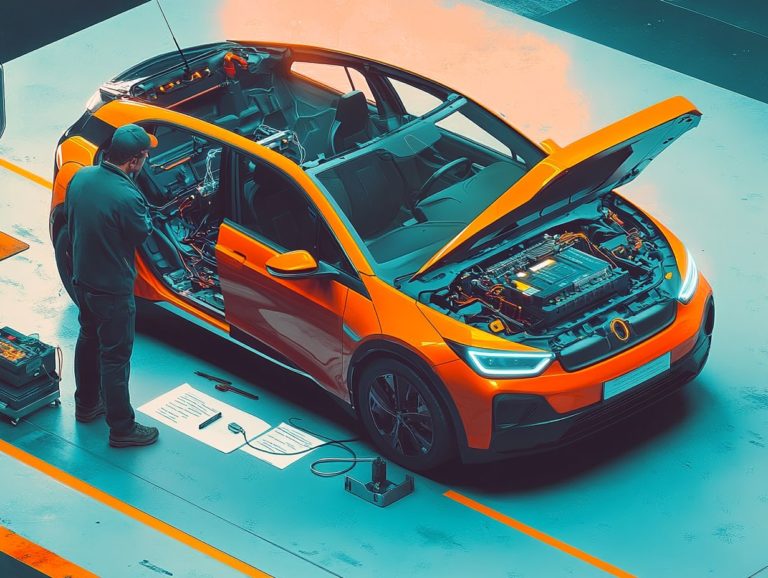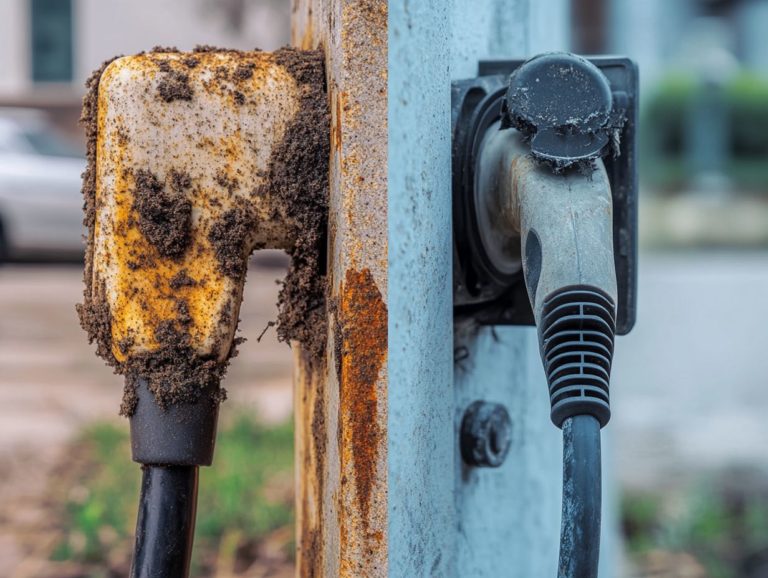understanding electric vehicle maintenance costs
Electric vehicles (EVs) are revolutionizing transportation. Understanding their maintenance costs is essential for anyone considering ownership!
Factors like battery life, replacement expenses, and routine upkeep significantly affect overall costs.
This article compares electric vehicle maintenance to traditional gas cars. We ll share tips to minimize expenses and explore trends that may shape your financial future.
Join us to uncover the true implications of owning an EV!
Contents
- Key Takeaways:
- What are Electric Vehicles and How Do They Work?
- Factors Affecting Electric Vehicle Maintenance Costs
- Comparing Maintenance Costs of Electric and Gasoline Vehicles
- Tips for Minimizing Electric Vehicle Maintenance Costs
- Future Outlook on Electric Vehicle Maintenance Costs
- Frequently Asked Questions
- What are electric vehicle maintenance costs?
- How do electric vehicle maintenance costs compare to traditional gasoline vehicles?
- What are some common routine maintenance tasks for electric vehicles?
- Are there any additional costs to consider when owning an electric vehicle?
- Do electric vehicles have warranties for maintenance costs?
- How can I reduce electric vehicle maintenance costs?
Key Takeaways:

Electric vehicles have much lower maintenance costs than gasoline vehicles. This is due to their simpler design and fewer moving parts.
The battery is the biggest factor affecting maintenance costs. Replacement can be a major concern for owners.
To keep costs down, practice proper charging habits and choose a model known for reliability.
What are Electric Vehicles and How Do They Work?
Electric vehicles (EVs) represent a breakthrough in transportation. They use electric energy stored in batteries instead of traditional fuels.
With fewer moving parts than gas-powered cars, EVs offer advantages like lower maintenance costs and efficient braking systems.
These vehicles use high-voltage batteries to power electric motors. Understanding how this system works helps appreciate the benefits of EVs over traditional gas engines.
Factors Affecting Electric Vehicle Maintenance Costs
Several factors determine the maintenance costs of electric vehicles. As an EV owner, it’s crucial to understand the role of EV maintenance in safety and how these variables impact your expenses.
From manufacturer recommendations for scheduled maintenance to repair costs tied to specific models, knowing these elements helps you make informed decisions.
Battery Life and Replacement Costs
The life and replacement costs of EV batteries are key factors in overall vehicle ownership costs. While they’re built to last, they eventually need replacement.
Typically, electric vehicle batteries last between 8 to 15 years. Usage and environmental conditions greatly affect their lifespan.
Replacement costs can range from $5,000 to $15,000, which is much higher than traditional gas vehicle maintenance.
Implement maintenance strategies like following manufacturer guidelines. Don t forget to check for warranties that might cover battery replacement.
These steps can extend battery life and bring peace of mind, making your electric driving experience rewarding!
Cost of Regular Maintenance
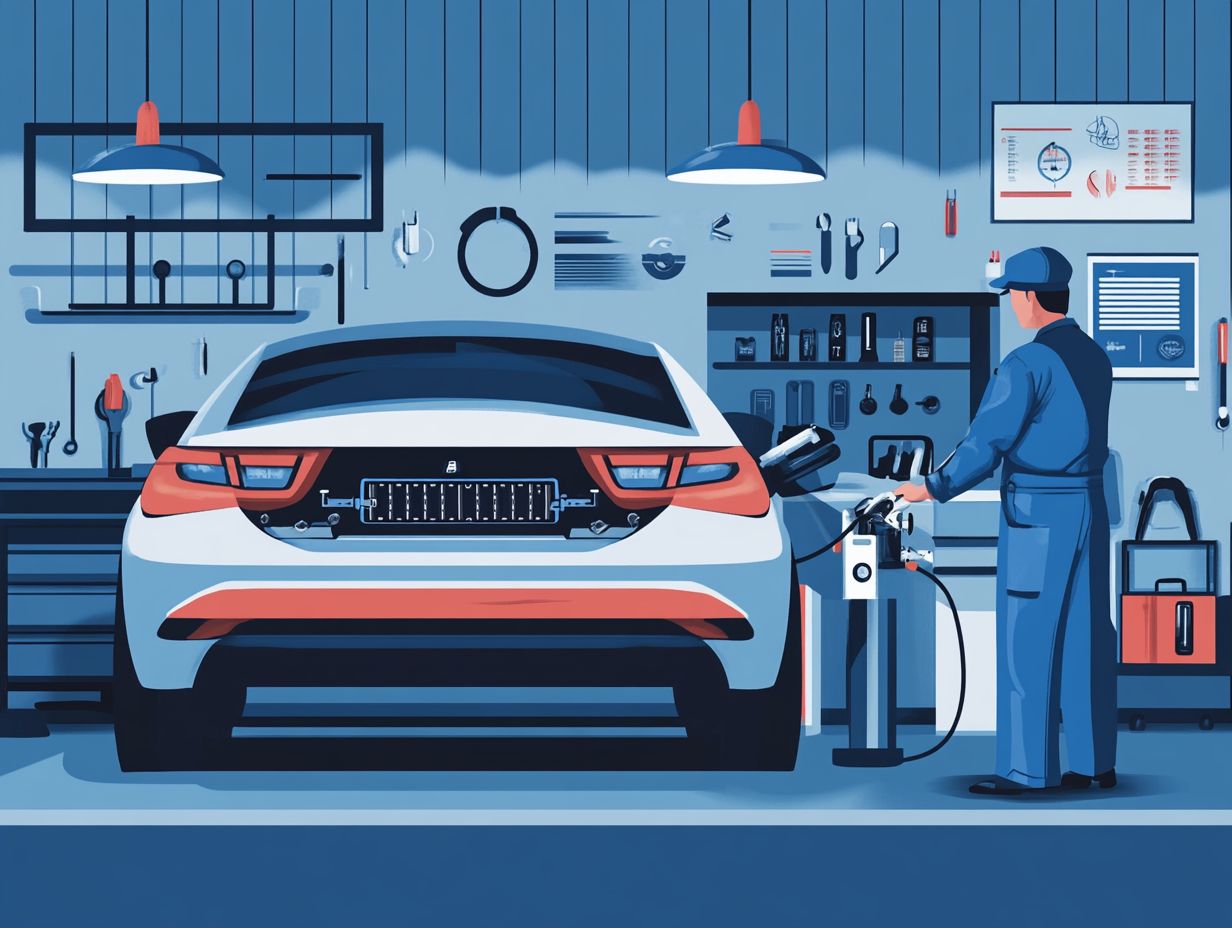
Understanding maintenance costs is essential for potential EV buyers. For example, understanding EV charging station maintenance can highlight differences from traditional gas-powered vehicles.
As an EV owner, you ll enjoy lower maintenance costs due to fewer moving parts and reduced wear and tear, leading to substantial savings over time.
When you delve into specific costs, consider mechanical inspections, which are generally less frequent for electric models. Unlike gas-powered vehicles, electric vehicles spare you from regular oil changes and exhaust system checks.
While you may still need service visits for battery health checks or software updates, these typically come at a lower price point than standard maintenance visits for gas vehicles. Additionally, the brake systems in EVs tend to last longer due to regenerative braking, enhancing your overall cost-effectiveness.
By understanding these differences, you can make informed financial decisions that suit your lifestyle.
Comparing Maintenance Costs of Electric and Gasoline Vehicles
When you compare the maintenance costs of Electric Vehicles (EVs) with those of gas-powered vehicles, it s crucial to grasp the distinctions that can significantly impact your overall ownership expenses.
Consider factors like repair bills and service intervals. These elements create a striking cost comparison that underscores the benefits of choosing an electric vehicle over traditional internal combustion engine models.
Cost Analysis of Common Maintenance Tasks
A cost analysis of common maintenance tasks for Electric Vehicles (EVs) offers valuable insights into the average expenses tied to tasks like brake repairs, power steering service, and coolant maintenance. By understanding these costs, you can plan your budget more effectively and recognize the overall lower maintenance expenses compared to gas-powered vehicles.
For example, brake replacement for EVs typically averages around $300, thanks to regenerative braking technology that often extends the lifespan of brake components. In contrast, similar repairs on gasoline cars can easily climb above $500.
The average cost for power steering service in an EV might be about $150, which is a significant saving compared to the $200 often encountered with traditional vehicles.
These figures matter because EVs generally require fewer fluids and less frequent oil changes, helping to reduce long-term maintenance costs. Consequently, the overall ownership expenses for electric vehicles tend to be lower over time, making them a more economically sustainable choice for those who care about the environment.
Tips for Minimizing Electric Vehicle Maintenance Costs
Want to keep your EV costs low? Here are some effective tips! Minimizing maintenance costs is crucial for Electric Vehicle (EV) owners, and using smart strategies can substantially lower expenses throughout the vehicle’s life.
By analyzing your driving history and patterns, you can optimize service intervals and maintenance checks to align with manufacturer recommendations. This approach ensures your EV operates at peak performance while keeping your costs effectively managed.
Proper Charging Habits
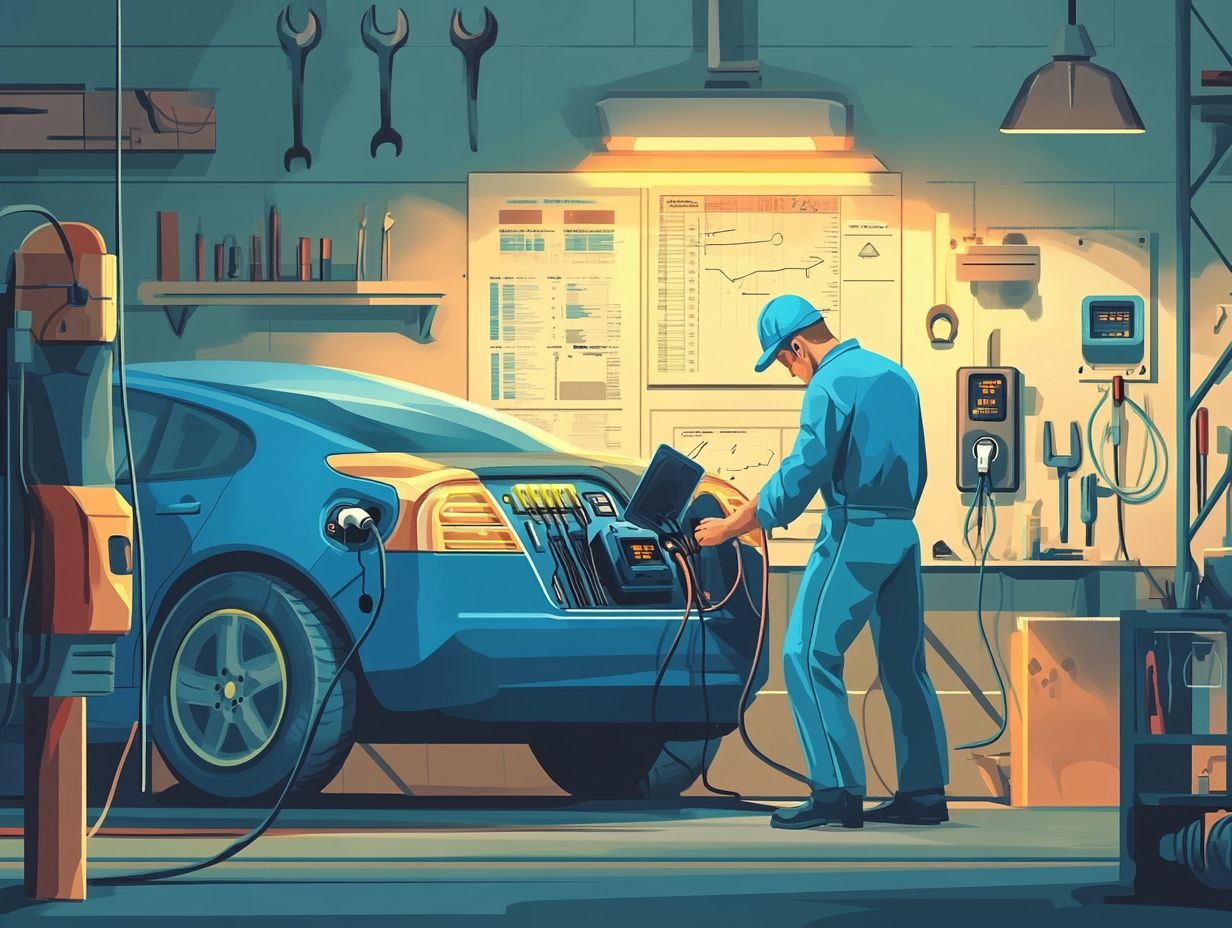
Developing proper charging habits is essential for you as an Electric Vehicle (EV) owner, as it directly influences the longevity of your battery and overall maintenance costs. By exploring the various charging options available, you can optimize your EV s performance while minimizing wear and tear from improper practices.
Choosing the right charging method is pivotal; whether you opt for home chargers, public fast chargers, or workplace solutions, each has its unique benefits.
For instance, regular overnight charging at home can lead to more efficient battery management, while utilizing fast-charge stations during long trips saves you precious time.
Adhering to a charging schedule that aligns with off-peak electricity rates can lead to noticeable savings. Ensure your charging equipment is compatible; using brand-approved chargers not only enhances your EV s battery health but also boosts overall efficiency, preventing potential damage and enriching your driving experience.
Choosing the Right Electric Vehicle Model
Choosing the right electric vehicle (EV) model is an important choice that significantly influences both maintenance costs and your overall ownership experience. With many models available on the market, grasping the average EV cost and conducting a thorough cost comparison will empower you to select a vehicle that perfectly aligns with your budget and preferences.
As you navigate this selection process, consider several key factors. Specific features that enhance comfort and convenience such as self-driving features or advanced infotainment systems can make a substantial difference in your day-to-day driving experience.
Performance metrics are equally crucial. Aspects like range, charging time, and acceleration will determine how well the vehicle accommodates your daily commute and lifestyle.
Don’t overlook the importance of evaluating how much each model will cost to maintain over time, as these can differ significantly based on technology and build quality.
Engaging in thorough reviews and comparisons across various brands will illuminate which electric vehicle best meets your personal driving needs, guiding you to a choice that enhances your life on the road.
Future Outlook on Electric Vehicle Maintenance Costs
The future of electric vehicle maintenance costs looks exciting for you as an EV owner, indicating a trend toward lower expenses and enhanced technologies.
As advancements in battery technology and charging infrastructure unfold, you can expect significant improvements.
Upcoming changes in maintenance practices, coupled with the availability of innovative tools, will elevate your ownership experience and help minimize the total maintenance costs linked to these vehicles.
Predicted Changes and Improvements
Predicted changes and advancements in electric vehicle technology are set to lower your maintenance costs and boost the reliability of your EV. With ongoing improvements in battery technology, diagnostic tools, and service practices, the future of electric vehicle maintenance is looking exceptionally bright.
These innovations promise to simplify routine servicing, allowing you to be alerted to potential issues before they escalate, thanks to predictive maintenance systems. Imagine smart sensors and advanced software providing real-time monitoring of your vehicle s key components, optimizing performance without the steep price tag of traditional repairs.
The rise of mobile servicing units and over-the-air updates means you can say goodbye to those frequent trips to the dealership. This proactive approach not only elevates your driving experience but also ushers in a new era of convenience and confidence for EV owners, fundamentally transforming your journey of ownership.
Frequently Asked Questions
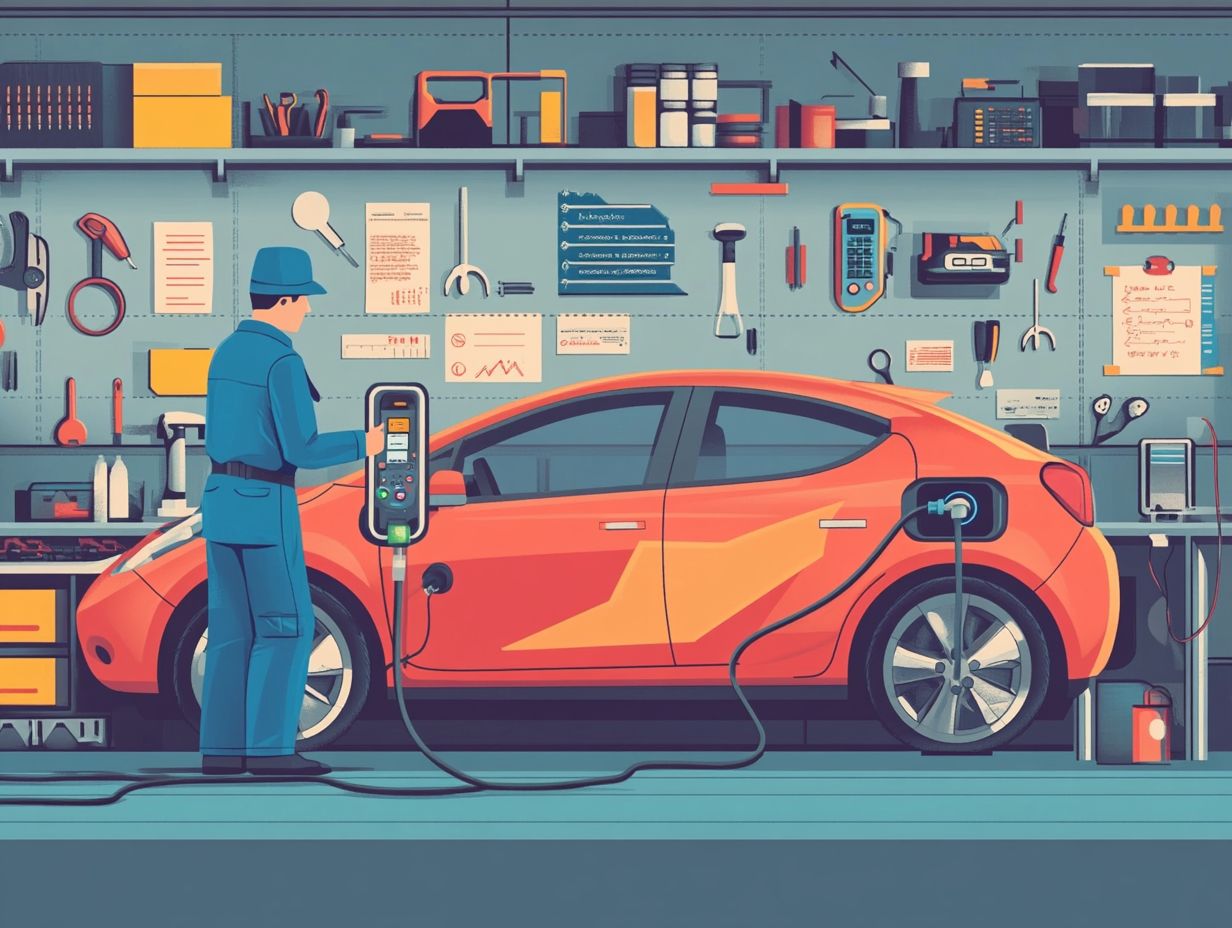
What are electric vehicle maintenance costs?
Electric vehicle maintenance costs refer to the expenses associated with keeping an electric vehicle in good working condition, including routine maintenance, repairs, and understanding EV tire maintenance and replacement parts.
How do electric vehicle maintenance costs compare to traditional gasoline vehicles?
Electric vehicle maintenance costs are typically lower than those of traditional gasoline vehicles. This is because electric vehicles have fewer moving parts and require less frequent maintenance. For a deeper insight into this aspect, consider exploring understanding the cost of home EV charging.
What are some common routine maintenance tasks for electric vehicles?
Common routine maintenance tasks for electric vehicles include checking and replacing fluids, inspecting and replacing tires, and monitoring and replacing batteries.
Are there any additional costs to consider when owning an electric vehicle?
In addition to maintenance costs, electric vehicle owners should also consider the cost of electricity and potential charging infrastructure upgrades. However, overall, these costs are typically lower than the cost of fuel for traditional gasoline vehicles.
Do electric vehicles have warranties for maintenance costs?
Most electric vehicles come with warranties that cover some or all of the maintenance costs, depending on the specific terms and conditions of the warranty. It is important to review the warranty before purchasing an electric vehicle.
Explore more about EVs and join the green revolution today!
How can I reduce electric vehicle maintenance costs?
Want to save money on your electric vehicle? Here s how! Follow the suggested maintenance schedule and keep the battery charged to minimize costs.
Buying a reliable electric vehicle can help lower long-term maintenance expenses. Look for well-reviewed models to ensure you’re making a sound investment.

